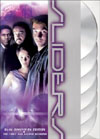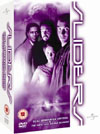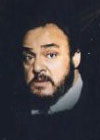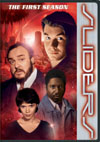The hotel-stay mentality that features in many later stories is featured here for the first time, alas all too briefly. Then, discarding the complexity of city-based society, we find ourselves in the relative simplicity of the woods where the next series of events might be a bit more plausible.... if only there weren't so many coincidences to take care of. The story is delivering good stuff up until the red flags of too much coincidence go off, and character portrayals begin to become too caricaturish and silly. The story then reveals it has not so much been developed naturally from the premise of a plausible parallel world, but rather as a modernization of the legends of Robin Hood. Not a bad idea, but with many elements of modern society glossed over, it feels like a forced fit, and the believability factor suffers accordingly. The Sliders' options for non-involvement, uninteresting as they may have been, quickly expire, reminding me strongly of similar motivational problems in "The Crusade" (Doctor Who story no. 14), particularly in its novelized form. But interestingly, Quinn is quickly bitten by the bug to be a hero, leading the others (some reluctantly) into the idea of embracing involvement. He quickly proves that he is less than brilliant about it, although I will only discuss all the details of his clumsy tactics in the In-depth Analysis version of this review. At one point, Quinn reaches desperately for any famous uplifting saying he can remember, whether it helps or has anything to do with the situation or not, spouting it with the energy of a motivational speaker gone mad. Luckily, his audience is refreshingly well fleshed out in its responses, unlike what we got in "The Daemons" (Doctor Who story no. 59), but the sequence still fails to make great TV. Coming back from a commercial break, one may easily not recognize at first as part of the show the montage sequence that covers several days worth of the story's activities, both because it is quite some time before any recognizable regulars or guest stars appear, and also because Mark Mothersbaugh chose to back the sequence with a jarring piece of music that seems more appropriate for frenzied advertising than the show itself. Quinn and Wade get some interesting dialogue-less moments during the sequence, which work really well for their character arcs - nice touch. Wade's dialogue scenes with the prince are not as great. Although the actors do a good job with what they get, the script itself seems unnecessarily padded with attempts at secrecy, skirting around the hot porridge instead of honestly hitting at the heart of the issues and dealing with them. Wade could easily and truthfully come out and say that she needs to go far away in a few days and will likely never be back. Her inexplicable inability to do so reminds me of so many similar situations written by David Whitaker in early Doctor Who stories. Interestingly, Wade immediately goes on to have a far superior scene with Quinn. They are completely honest with each other, and thus get dialogue that achieves far more, and in about 1/3 of the time. Jerry O'Connell and Sabrina Lloyd knock the scene out of the park with great performances. Excellent. Quinn's shaky heroics go down the drain in the all important final stages of the story though. Luckily, Arturo steps up to the plate, with the help of the others. It's Ian Chesterton upstaging William Hartnell's Doctor all over again. Unfortunately, Mark Mothersbaugh initiates this angle by creating another overly frenzied and jarring cue for a supposedly stealthy sequence, which doesn't help. Music is just not this episode's strong point. Another dynamic is also at work... but I won't spoil any of that here. Although more time is taken to flesh out the social dynamics of this world than was done back in the Russian America seen in the second half of the pilot, Russian America perhaps got away with it a little better by being more archetypal, and needing fewer explanatory scenes, thus being able to focus on more interesting scenes. Sheriff Arturo is played well enough by Rhys-Davies in this tale, effectively frightening when appropriate, yet his addiction for spending so much time in TV studios is bizarre, and without seeing how the common people actually react (as was demonstrated brilliantly in "Vengeance on Varos" - Doctor Who story no. 139), really lacks balance and purpose. Gary Jones is also back from the pilot story, playing yet another double of the character Hurley. His familiar ineptitude is most welcome, being another good element that doesn't quite manage to raise the calibre of the story very much.
This story has become available on DVD. Click on the Amazon symbol for the location nearest you for pricing and availability:
Comments on this article are welcome. You may contact the author from this page:
|









